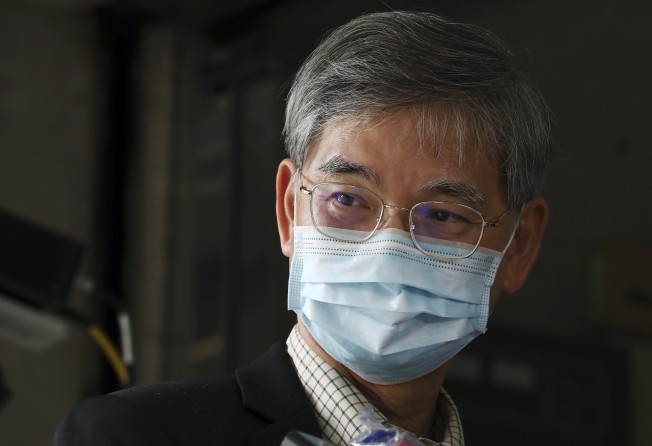
Hong Kong unemployment falls to 6 per cent as coronavirus pandemic’s grip on economy eases
- Jobless rate for March-May period down 0.4 percentage points on the previous three-month period
- Labour minister says jobs market improving as the economy recovers, public health crisis recedes

Hong Kong’s jobless rate dropped to 6 per cent for the three-month period ending in May, as the economic impact of the coronavirus pandemic appeared to ease amid falling case counts and a relaxation of social-distancing rules.
The rolling figure for March to May was down 0.4 percentage points from the three-month period covering February to April, the Census and Statistics Department revealed on Thursday.
Some 233,300 people were still out of work, about 14,200 fewer than in the preceding period. The number of underemployed people fell 15 per cent to 107,400.
Unemployment declined across a range of industries in the latest reporting period, with the rate falling to 11.3 per cent in the food and beverage sector, 8.1 per cent in retail and 7.8 per cent in accommodation.
Looking ahead, Secretary for Labour and Welfare Law Chi-kwong said that as the economy continued to rebound, the labour market should also gradually improve, especially if the local epidemic remained well contained.
“Yet, the evolving global pandemic situation remains a key source of uncertainty. As the pace of economic recovery is uneven across sectors, the unemployment rates in some sectors may take a longer time to return to pre-pandemic levels,” Law warned.

Financial Secretary Paul Chan Mo-po previously predicted that the city’s unemployment rate could drop to levels similar to those seen a year ago, but pointed out that a full economic recovery would hinge on boosting vaccinations against Covid-19 and reopening the city’s borders.
As the global coronavirus pandemic took its toll on the local economy, Hong Kong’s unemployment rate peaked at 7.2 per cent for the three-month period ending in February – the city’s worst jobless numbers since 2004. By April, unemployment had fallen to 6.4 per cent.
The government in February relaxed a string of tough social-distancing regulations – reopening gyms, cinemas and beauty salons, and allowing some of those whose livelihoods had been put on hold during the four-month closure to get back to work.
In late April, shortly before the end of the city’s fourth wave of Covid-19 infections, the government also rolled out a “vaccine bubble” scheme further relaxing restrictions for certain businesses based on the vaccination status of staff and patrons.
Law on Thursday acknowledged the poor employment prospects facing fresh graduates, and pointed to government measures such as a job creation scheme under the Anti-epidemic Fund and a Greater Bay Area youth employment initiative in January aimed at encouraging young Hongkongers to work in mainland China.
But the market for jobseekers appears to have also improved in the three months to May, with the average number of vacancies in the private sector jumping almost 60 per cent year on year to around 81,880, according to data tracked by the Labour Department.
Professor Simon Lee Siu-po, co-director of the international business and Chinese enterprise programme at Chinese University, said the worst was over for the city’s economy. Still, he predicted that the jobless rate for some tourism-dependent sectors, including retail, would not improve significantly until the city fully reopened to international travel.
“As long as most of the city’s borders remain closed, with global travel under stringent restrictions, there won’t be a robust recovery for these sectors,” he said.
However, Lee was upbeat about the pandemic situation in Hong Kong, saying the government now appeared to have a better grasp on containing the virus.
Separately, Hong Kong on Thursday was again named the most expensive location in the world for overseas workers to live, despite falling rental prices and a weakened currency, according to a new survey by the data firm ECA International.
In the survey, conducted in March, Tokyo overtook New York to move into second place, followed by Geneva in third. New York dropped to fourth, while regional rival Singapore dropped from 12th to 13th.